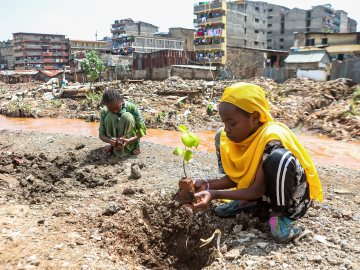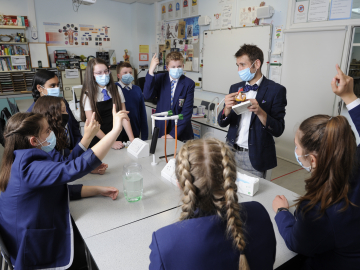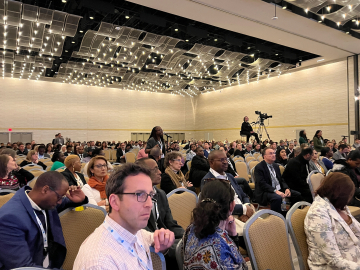The Changemaker: WHO DG Candidate Sania Nishtar’s Q&A, Part I
The next WHO Director-General needs be a changemaker, a campaigner who can meet with heads of state on critical health issues and persuade them to “get it done,” says Sania Nishtar, one of 3 finalists in the running to lead the organization.
Nishtar has held numerous positions in Pakistan’s government and has deep experience in civil society and at WHO. In a 4-part Q&A with GHN, Nishtar discusses what her priorities would be as DG, what needs to change at WHO, the role of politics in global health and the reasons why she should be elected to WHO's top leadership role.
In this first installment, Nishtar shares what she considers her top qualification for the job, confronts the idea that the next DG should be from Africa and explores WHO’s readiness for the next global pandemic.
If you had to name one qualification that would serve you best as Director General, what would that be?
I have been a changemaker my entire career, and one thing WHO needs now is that. I have delivered results in the most difficult and resource-constrained settings with integrity and transparency in my civil society, ministerial, multilateral and other roles. I have led on hard issues in ways that are sustainable and constructive. I would accelerate reforms and drive an accountability revolution across the organization to reclaim its reputation and restore trust in its ability to act as the world’s lead health agency.
What would be your three biggest priorities as DG?
My priorities are signaled in the New Vision for WHO and the 10 Pledges for Action. My vision for WHO is one in which “WHO reclaims its primacy and earns the world’s trust as its lead health agency, and has the ability to foster and sustain partnerships to achieve the vision for health—universal attainment of the highest possible level of health and well-being.” I make 10 pledges to achieve this vision. These pledges are grounded in WHO’s constitutional parameters, its exclusive mandates, recent global commitments, a universal outlook for health, country systems strengthening and commitment to build further on the progress currently underway.
What do you say to people who say that it’s time for the next Director-General to be from Africa?
According to the new framework of the election, it is stated that preference may be given to regions that have not had Directors-General in the past. There are three WHO regions from which there have been no Directors-General, the African Region, the Eastern Mediterranean Region and the South East Asian Region. Each of these three regions has equal “entitlement.” However, I don’t think that the decision to elect the DG should be based on political or geographic grounds.
This organization is at such a sensitive juncture. I’m not playing politics in my campaign. I’m not telling people to support me because I come from EMRO. I’m not telling people to support me because I come from a developing country, because I’m a woman. I’m telling them, “Look at my track record. Have I delivered change or not? Do I stand for accountability, and transparency, and results? And if you’re convinced that I do, vote for me. And if there’s somebody who does it better, please go ahead.” Because that is what the criteria should be.
I don’t think people appreciate what we’re up against. Tomorrow, if there is a virus outbreak at the scale of the 1918 Spanish flu, do you know what is at stake? Hundreds of million people could die within a matter of weeks and months. Development gains of the last century will be wiped out. And the impact would not just be for health systems, but for societies and economies. And it’s not a question of “if.” It’s a question of “when.” We need to get our act together. The candidate’s capability to deliver and track record should matter.
Is WHO better prepared for pandemic flu now than it was before Ebola?
Well, Ebola has been a wake-up call for WHO. Fortunately, the new health emergencies program has been approved by the 69th World Health Assembly. The challenge is now to implement it fully … including mobilization of large-scale resources for the program, which Member States have committed to raise.
I strongly support the new program, including its “all hazards” approach, and new response mechanisms. I fully realize that these arrangements place the onus of strategic and technical leadership responsibility on WHO. I will work closely with the regional offices and regional directors to ensure that all WHO offices align their structures, staffing, and processes with the “One Program” centered on the full cycle of health emergency management.
WHO is one part of where the change needs to happen. The other part is at the country level. Because WHO cannot deliver unless things change in countries. WHO must work more effectively with member states to enhance their core public health capacities as demanded by the International Health Regulations.
There are times when WHO has to be stronger in communicating the shortfalls. The new DG has to be a campaigner. Go from head of state to head of state, and get it done. And then, of course, the other side of the equation are the other agencies which can bring value. WHO should not try to do everything itself. If there is another agency which has a comparative advantage and can do something better, it should leverage it.
When dealing with a sovereign country, WHO doesn’t have a whole lot of leverage. So how do you persuade a country’s leader to do the right thing when she or he may not be inclined to?
I don’t believe that WHO doesn’t have leverage.
What would it be?
WHO has a lot of leverage and can hold sway, in many parts of the world, but it must communicate what needs to be done effectively, with clarity. It must not go to countries with a wish list, but outline specific asks, and then follow it up with relevant technical help.
Even with developed countries?
Yes, I believe so. They have better institutions and systems though and have the ability to respond better. WHO must play its role honestly and impartially, and once it regains the world’s trust it will have better leverage, worldwide.
Read other installments of Global Health NOW’s 4-part Q&A with Sania Nishtar here.
Join the thousands of subscribers who rely on Global Health NOW summaries and exclusive articles for the latest public health news. Sign up for our free weekday enewsletter, and please share the link with friends and colleagues: Subscribe to GHN
Sania Nishtar. Image by World Economic Forum from Cologny, Switzerland (Health Collaboration as a Bridge) [CC BY-SA 2.0], via Wikimedia Commons

![Sania Nishtar. Image by World Economic Forum from Cologny, Switzerland (Health Collaboration as a Bridge) [CC BY-SA 2.0], via Wikimedia Commons](/sites/default/files/styles/article_feature_small/public/images/2017-03/WikimediaCommons-Sania_Nishtar_at_the_World_Economic_Forum_on_India_2012_0.jpg?h=568c2f42)



